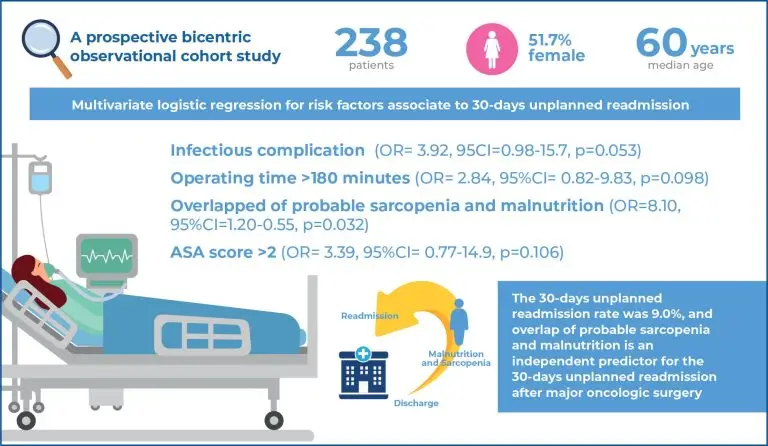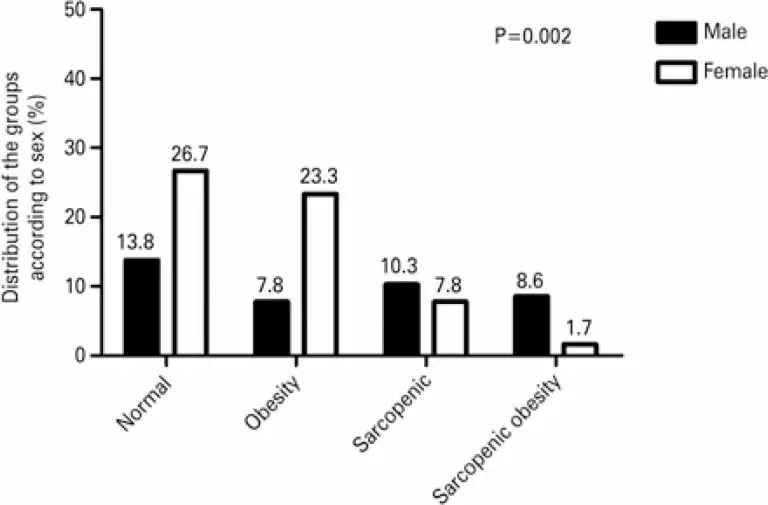07/Oct/2024
The 30-day readmission rate of patients with an overlap of probable sarcopenia and malnutrition undergoing major oncological surgery
DOI: 10.31744/einstein_journal/2024AO0733
Highlights Probable sarcopenia plus malnutrition was significantly associated with unplanned readmission. Overlap of probable sarcopenia and malnutrition was an independent risk factor for readmission. Certification of whether the patient is malnourished and/or sarcopenic preoperatively is necessary. SARC-F and subjective global assessment can effectively and easily assess sarcopenia and malnutrition at admission. ABSTRACT Objective: To assess the 30-day unplanned readmission rate and its association with overlapping probable sarcopenia and malnutrition after major oncological surgery. Methods: A prospective bicentric observational cohort study […]
Keywords: Malnutrition; Nutritional status; Patient readmission; Postoperative complications; Sarcopenia; Surgical oncology
22/Jul/2021
Association between fibroblast growth factor 23 and functional capacity among independent elderly individuals
einstein (São Paulo). 22/Jul/2021;19:eAO5925.
View Article22/Jul/2021
Association between fibroblast growth factor 23 and functional capacity among independent elderly individuals
DOI: 10.31744/einstein_journal/2021AO5925
ABSTRACT Objective To examine the association of between serum fibroblast growth factor 23 and the functional capacity among independent individuals, aged 80 or older. Methods The functional capacity of 144 elderly was assessed by Instrumental Activities of Daily Living, cognitive tests, handgrip strength and the timed ability to rise from a chair and sit down five times. Fibroblast growth factor 23 was measured using an ELISA assay. Results Participants in the lowest fibroblast growth factor 23 tertile had the highest […]
Keywords: Activities of Daily Living; Aged, 80 and over; Aging; Cognitive aging; Fibroblast growth factors; Functional status; Kidney/physiology; Sarcopenia
13/Apr/2020
Evaluation of nutritional risk factors in hematopoietic stem cell transplantation-eligible patients
DOI: 10.31744/einstein_journal/2020AO5075
ABSTRACT Objective To evaluate the nutritional risk factors in patients eligible for hematopoietic stem cell transplantation. Methods A cross-sectional, descriptive study conducted with patients recruited from an hematology outpatient clinic. Study variables included demographic and clinical data, patient-generated global subjective assessment findings, anthropometric indicators, food intake and oxidative stress levels. The level of significance was set at 5% (p
Keywords: Food consumption; Hematopoietic stem cells; Nutritional status; Oxidative stress; Sarcopenia; Stem cell transplantation
20/Aug/2019
Sarcopenia and sarcopenic obesity as prognostic predictors in hospitalized elderly patients with acute myocardial infarction
DOI: 10.31744/einstein_journal/2019AO4632
ABSTRACT Objective: To investigate the potential value of sarcopenia and sarcopenic obesity as prognostic predictors in hospitalized elderly patients with acute myocardial infarction. Methods: A cross-sectional study based on data collected from elderly patients with acute myocardial infarction, admitted to a public hospital located in the Northeastern region of Brazil, from April to July 2015. The diagnosis of sarcopenia was based on muscle mass, muscle strength and physical performance measurements. Cardiovascular risk and prognostic markers, such as troponin and creatine […]
Keywords: Aged; Cardiovascular diseases; Myocardial infarction; Obesity; Sarcopenia
08/Dec/2017
Obesity, sarcopenia, sarcopenic obesity and reduced mobility in Brazilian older people aged 80 years and over
einstein (São Paulo). 08/Dec/2017;15(4):435-40.
View Article08/Dec/2017
Obesity, sarcopenia, sarcopenic obesity and reduced mobility in Brazilian older people aged 80 years and over
DOI: 10.1590/S1679-45082017AO4058
ABSTRACT Objective: To analyze which abnormalities in body composition (obesity, sarcopenia or sarcopenic obesity) are related to reduced mobility in older people aged 80 years and older. Methods: The sample included 116 subjects aged 80 years and older. The body composition was measured using dual-energy X-ray absorptiometry (DXA) and mobility was assessed by motor tests. The χ2 test was used to analyze the proportion of older people with sarcopenia, obesity and sarcopenic obesity based on sex as well as to […]
Keywords: Aged; Aged, 80 and over; Aging; Body composition; Densitometry; Gait; Mobility limitation; Obesity; Sarcopenia




